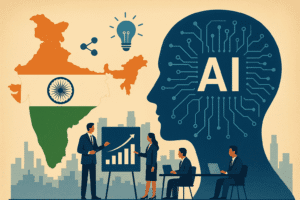India’s AI Ascent: Beyond Automation, Toward a New Organizational Blueprint
Indian businesses are leading a profound shift in the future of work, with 59% of leaders already deploying AI agents to automate team-wide workflows. This movement goes beyond simple efficiency, aiming to eliminate mundane tasks and free human talent for strategic, creative work. Companies are evolving into “Frontier Firms,” built on hybrid human-AI teams that report dramatically higher employee thriving rates. Rather than replacing jobs, AI is reshaping them, spurring demand for new roles like AI workflow designers and agent managers.
Success hinges on major upskilling initiatives, which over half of leaders have made a top priority. This strategic embrace of AI positions Indian enterprises not merely as adapters but as architects of a new, more human-centric organizational blueprint.

India’s AI Ascent: Beyond Automation, Toward a New Organizational Blueprint
A new wave of automation is sweeping through Indian businesses, but it’s not the mindless, job-replacing machinery of the past. According to Microsoft’s latest Work Trend Index 2025, 59% of Indian business leaders are already deploying sophisticated AI agents to automate complex workflows across entire teams. More strikingly, 93% expect to do so within the next year and a half.
This isn’t just about efficiency; it’s a fundamental reimagining of work itself. India is not just participating in the global AI race—it is poised to set the pace, forcing a conversation that moves beyond fear of obsolescence and toward a vision of radical collaboration between human and artificial intelligence.
The End of “Drudgery” and the Dawn of Creation
The driving force behind this shift is a universal pain point: what Puneet Chandok, President of Microsoft India & South Asia, calls “the drudgery of work.” In a speech at the report’s unveiling, Chandok envisioned a future where AI unlocks human potential by removing mundane daily tasks, allowing professionals to “rediscover the joy of creation.”
This requires more than just new tools; it demands a new organizational DNA. “If intelligence and expertise is on-tap for everybody,” Chandok notes, “that would rewire not just the economics of your business but also management practices. You would need a new organisational blueprint for this world.”
The “Frontier Firm”: India’s New Competitive Advantage
That new blueprint is crystallizing in what Microsoft dubs the “Frontier Firm.” These are organizations built on hybrid human-AI teams, characterized by agile operations, rapid value generation, and deep AI integration into every decision and workflow.
The data suggests Indian companies are embracing this model with remarkable success. Employees at these Indian Frontier Firms reported a 71% thriving rate—nearly double the global average of 37%. They report more capacity for meaningful, strategic work and express greater optimism about their roles. This isn’t just a productivity win; it’s a cultural and human-centric one, suggesting that AI, when integrated thoughtfully, can significantly enhance job satisfaction.
Reshaping, Not Replacing: The New AI Job Market
Contrary to dystopian headlines, the report suggests AI is primarily a force for reshaping roles, not eliminating them. The focus is shifting from replacement to augmentation.
92% of Indian leaders are considering adding new, AI-specific roles to their organizations. This signals the birth of an entirely new career ecosystem, including:
- AI Workflow Designers: Architects who design and orchestrate processes between human and AI teams.
- Software Operators: Professionals who manage and maintain AI agent operations.
- “Agent Bosses”: A novel management role focused on leading and optimizing teams of AI agents to maximize their output.
Furthermore, 57% of leaders are looking toward building multi-agent systems—where multiple AI agents work in concert to automate intricate, multi-step tasks that were previously the domain of human teams.
The Imperative of Upskilling: The Human in the Loop
This transformation hinges on a massive investment in human capital. Recognizing this, 51% of Indian leaders have identified upskilling as their top priority for the next 12-18 months. The goal is to build a workforce fluent in AI collaboration.
The responsibility for this learning is also shifting. A significant 63% of managers believe AI training will become a core team responsibility within five years, moving from a centralized HR function to an integral part of every team’s routine.
However, a readiness gap persists. While 80% of leaders are familiar with AI agents, only 66% of employees are, highlighting a critical need for inclusive training and transparent communication to ensure a smooth transition.
The Bottom Line for Indian Businesses
The message from the data is clear: The future belongs to organizations that can successfully merge human ingenuity with AI’s computational power. The companies that will lead are those that:
- Embrace the Frontier Model: Actively design workflows for human-AI collaboration, focusing on agility and deep integration.
- Invest in People, Not Just Tech: Prioritize large-scale upskilling to close the AI fluency gap between leadership and employees.
- Create New Roles: Proactively define and hire for the new jobs that an AI-augmented world demands.
- Cultivate a Culture of Creation: Use the gains from automation to free employees from mundane tasks and empower them to innovate, strategize, and connect on a more human level.
India’s rapid adoption of AI agents is more than a statistic; it’s a signal of a broader economic and cultural shift. The nation’s businesses are strategically positioning themselves to not just adapt to the AI era, but to help define it, building a future where work is less about drudgery and more about the uniquely human capacity for creation.
You must be logged in to post a comment.